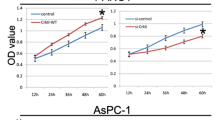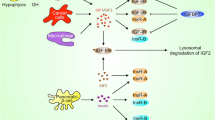Abstract
Background
Insulin-like growth factor 1 receptor (IGF1R) plays important roles in the progression of pancreatic cancer. However, the underlying mechanism remains unclear.
Aims
The purpose of this study was to investigate the effects of IGF1R knockdown on the proliferation, apoptosis and chemosensitivity of pancreatic cancer cells, and explore the possible mechanisms.
Methods
Pancreatic cancer cells expressing IGF1R shRNA were established, and the cell proliferation, colony formation, and chemosensitivity to gemcitabine were examined in vitro. The activation of AKT and NF-κB was detected by Western blot analysis and luciferase assay, respectively. Xenograft mice models were established to evaluate the in vivo anti-tumor effects of IGF1R knockdown.
Results
IGF1R knockdown notably inhibited pancreatic cancer cell proliferation and colony formation, induced apoptosis, and inhibited xenograft tumor growth. Moreover, IGF1R knockdown significantly enhanced chemosensitivity to gemcitabine in pancreatic cancer cells, and this was correlated with the inhibition of PI3K/AKT and NF-κB pathways.
Conclusions
IGF1R knockdown suppresses tumor growth and enhances chemosensitivity in pancreatic cancer via the inhibition of PI3K/AKT and NF-κB pathways, and is a promising approach to overcome the chemoresistance of pancreatic cancer.





Similar content being viewed by others
References
Miljković MD, Girotra M, Abraham RR, Erlich RB. Novel medical therapies of recurrent and metastatic gastroenteropancreatic neuroendocrine tumors. Dig Dis Sci. 2012;57:9–18.
Liang QL, Wang BR, Chen GQ, Li GH, Xu YY. Clinical significance of vascular endothelial growth factor and connexin43 for predicting pancreatic cancer clinicopathologic parameters. Med Oncol. 2010;27:1164–1170.
Miller BS, Yee D. Type I insulin-like growth factor receptor as a therapeutic target in cancer. Cancer Res. 2005;65:10123–10127.
Sachdev D, Yee D. Disrupting insulin-like growth factor signaling as a potential cancer therapy. Mol Cancer Ther. 2007;6:1–12.
Yan HJ, Liu WS, Sun WH, et al. miR-17-5p inhibitor enhances chemosensitivity to gemcitabine via upregulating Bim expression in pancreatic cancer cells. Dig Dis Sci. 2012;57:3160–3167.
Bergmann U, Funatomi H, Yokoyama M, Beger HG, Korc M. Insulin-like growth factor I overexpression in human pancreatic cancer: evidence for autocrine and paracrine roles. Cancer Res. 1995;55:2007–2011.
Olmos D, Tan DS, Jones RL, Judson IR. Biological rationale and current clinical experience with anti-insulin-like growth factor 1 receptor monoclonal antibodies in treating sarcoma: twenty years from the bench to the bedside. Cancer J. 2010;16:183–194.
Beltran PJ, Mitchell P, Chung YA, et al. AMG 479, a fully human anti-insulin-like growth factor receptor type I monoclonal antibody, inhibits the growth and survival of pancreatic carcinoma cells. Mol Cancer Ther. 2009;8:1095–1105.
Li M, Li H, Adachi Y, et al. The efficacy of IGF-I receptor monoclonal antibody against human gastrointestinal carcinomas is independent of k-ras mutation status. Clin Cancer Res. 2011;17:5048–5059.
Zhang H, Sachdev D, Wang C, Hubel A, Gaillard-Kelly M, Yee D. Detection and downregulation of type I IGF receptor expression by antibody-conjugated quantum dots in breast cancer cells. Breast Cancer Res Treat. 2009;114:277–285.
Shu S, Yang Y, Li X, et al. Down-regulation of IGF-1R expression inhibits growth and enhances chemosensitivity of endometrial carcinoma in vitro. Mol Cell Biochem. 2011;353:225–233.
Burris HA III, Moore MJ, Andersen J, et al. Improvements in survival and clinical benefit with gemcitabine as first-line therapy for patients with advanced pancreas cancer: a randomized trial. J Clin Oncol. 1997;15:2403–2413.
Schniewind B, Christgen M, Kurdow R, et al. Resistance of pancreatic cancer to gemcitabine treatment is dependent on mitochondria-mediated apoptosis. Int J Cancer. 2004;109:182–188.
Ng SS, Tsao MS, Nicklee T, Hedley DW. Wortmannin inhibits pkb/akt phosphorylation and promotes gemcitabine antitumor activity in orthotopic human pancreatic cancer xenografts in immunodeficient mice. Clin Cancer Res. 2001;7:3269–3275.
Arlt A, Schäfer H. NFkappaB-dependent chemoresistance in solid tumors. Int J Clin Pharmacol Ther. 2002;40:336–347.
Sclabas GM, Fujioka S, Schmidt C, Evans DB, Chiao PJ. NF-kappaB in pancreatic cancer. Int J Gastrointest Cancer. 2003;33:15–26.
Reddy SA, Huang JH, Liao WS. Phosphatidylinositol 3-kinase as a mediator of TNF-induced NF-kappa B activation. J Immunol. 2000;164:1355–1363.
Chen D, Niu M, Jiao X, Zhang K, Liang J, Zhang D. Inhibition of AKT2 enhances sensitivity to gemcitabine via regulating PUMA and NF-κB signaling pathway in human pancreatic ductal adenocarcinoma. Int J Mol Sci. 2012;13:1186–1208.
Acknowledgments
This study was supported by grants from the National Natural Science Foundation of China (No. 81172184) and Beijing Natural Science Foundation (No.7122188), and the Overseas Study Program of the China Scholarship Council, Beijing, China. We thank Professor Zebin Mao at the Department of Biochemistry and Molecular Biology in Health Science Center, Peking University for his assistance and technical support.
Conflict of interest
None.
Author information
Authors and Affiliations
Corresponding author
Additional information
Xiaodong Tian and Kun Hao contributed equally to this work.
Rights and permissions
About this article
Cite this article
Tian, X., Hao, K., Qin, C. et al. Insulin-Like Growth Factor 1 Receptor Promotes the Growth and Chemoresistance of Pancreatic Cancer. Dig Dis Sci 58, 2705–2712 (2013). https://doi.org/10.1007/s10620-013-2673-2
Received:
Accepted:
Published:
Issue Date:
DOI: https://doi.org/10.1007/s10620-013-2673-2




